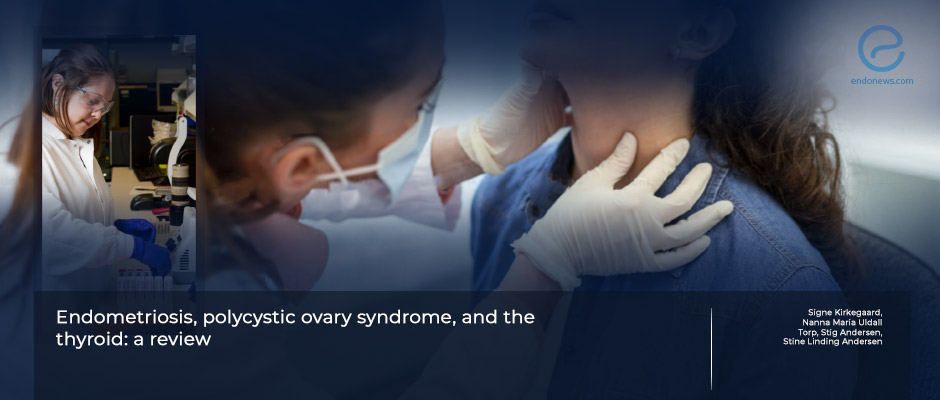Exploring the role of thyroid function in endometriosis and polycystic ovary syndrome
Mar 1, 2024
Review study sheds light on thyroid dysfunctions in gynecological disorders
Key Points
Highlight
- A potential link between endometriosis and hyperthyroidism, as well as polycystic ovary syndrome (PCOS) and hypothyroidism has been found.
Importance
- Understanding the association between endometriosis and PCOS with thyroid dysfunction can aid in the early detection and management of these conditions in women of reproductive age.
- Identifying subtle elevations of thyroid autoantibodies in women with endometriosis highlights the need for comprehensive assessment and monitoring of thyroid function in gynecological patients.
What’s done here
- This is a review study aiming to explore the association between endometriosis, PCOS, and thyroid dysfunction.
- It also investigated thyroid function and autoimmunity in a Danish cohort of pregnant women to evaluate the interplay with these gynecological disorders.
Key results
- A link was suggested between endometriosis and hyperthyroidism, as well as between PCOS and hypothyroidism.
- No significant association was found between thyroid autoantibodies and PCOS in the Danish cohort.
- Hormonal and body composition patterns in hyperthyroidism and hypothyroidism mirrored those seen in endometriosis and PCOS, respectively.
- Subtle elevations of TSH-receptor antibody was associated with endometriosis, indicating a potential biomarker for the condition.
- Thyroid autoimmunity was predominantly associated with hypothyroidism in PCOS, with no significant link observed for hyperthyroidism.
Lay Summary
Endometriosis, polycystic ovary syndrome (PCOS), and thyroid disorders are prevalent among women of reproductive age, yet their exact impacts on reproductive health and underlying mechanisms remain unclear. Given the close association of these conditions through the endocrine system, Kirkegaard et al. from Aalborg, Denmark aimed to explore existing literature to investigate the potential associations between thyroid dysfunction/autoimmunity and gynecological disorders alongside an evaluation of associations in a Danish cohort of early pregnant women. The authors hypothesized that the contrasting biochemical profiles of hyperthyroidism and hypothyroidism might manifest differently in endometriosis and PCOS. The article was published in the January 2024 issue of the journal Endocrine Connections.
Regarding the association between endometriosis and thyroid disease, a total of 8 original observational studies were identified between 2002 and 2023. They all showed varied results, with some indicating an association with elevated thyroid autoantibodies, particularly TSH receptor antibodies. The authors commented that methodological inconsistencies and small sample sizes call for larger studies for definitive conclusions.
On the other hand, the association between thyroid disorders and PCOS has been extensively studied, with a trend toward hypothyroidism and thyroid autoimmunity, particularly thyroid peroxidase antibodies and/or thyroglobulin antibodies, being dominant. None of the identified 30 studies that varied in design and population size found a link with hyperthyroidism.
In addition, the study utilized samples from the North Denmark Region Pregnancy Cohort. Among 606 pregnant women studied, those with endometriosis showed higher levels of TSH-receptor antibodies, suggesting a potential association. However, no significant link was found between PCOS and thyroid autoantibodies. Maternal TSH levels did not differ significantly between groups. The authors stated that these findings support a possible connection between TSH-receptor antibodies and endometriosis but do not indicate a causal link with abnormal maternal TSH levels.
Differences in menstrual cycle, hormone levels, and body composition were noted between these gynecological disorders and thyroid dysfunction, indicating complex interactions that warrant further investigation. Despite these findings, the underlying mechanisms remain unclear, and large-scale studies are needed to validate and clarify the observed associations. Understanding the interplay between endometriosis, PCOS, and thyroid disorders could inform diagnosis, treatment, and management strategies for affected individuals.
Research Source: https://pubmed.ncbi.nlm.nih.gov/38078917/
endometriosis thyroid hyperthyroidism hypothyroidism autoimmune polycystic ovary syndrome

